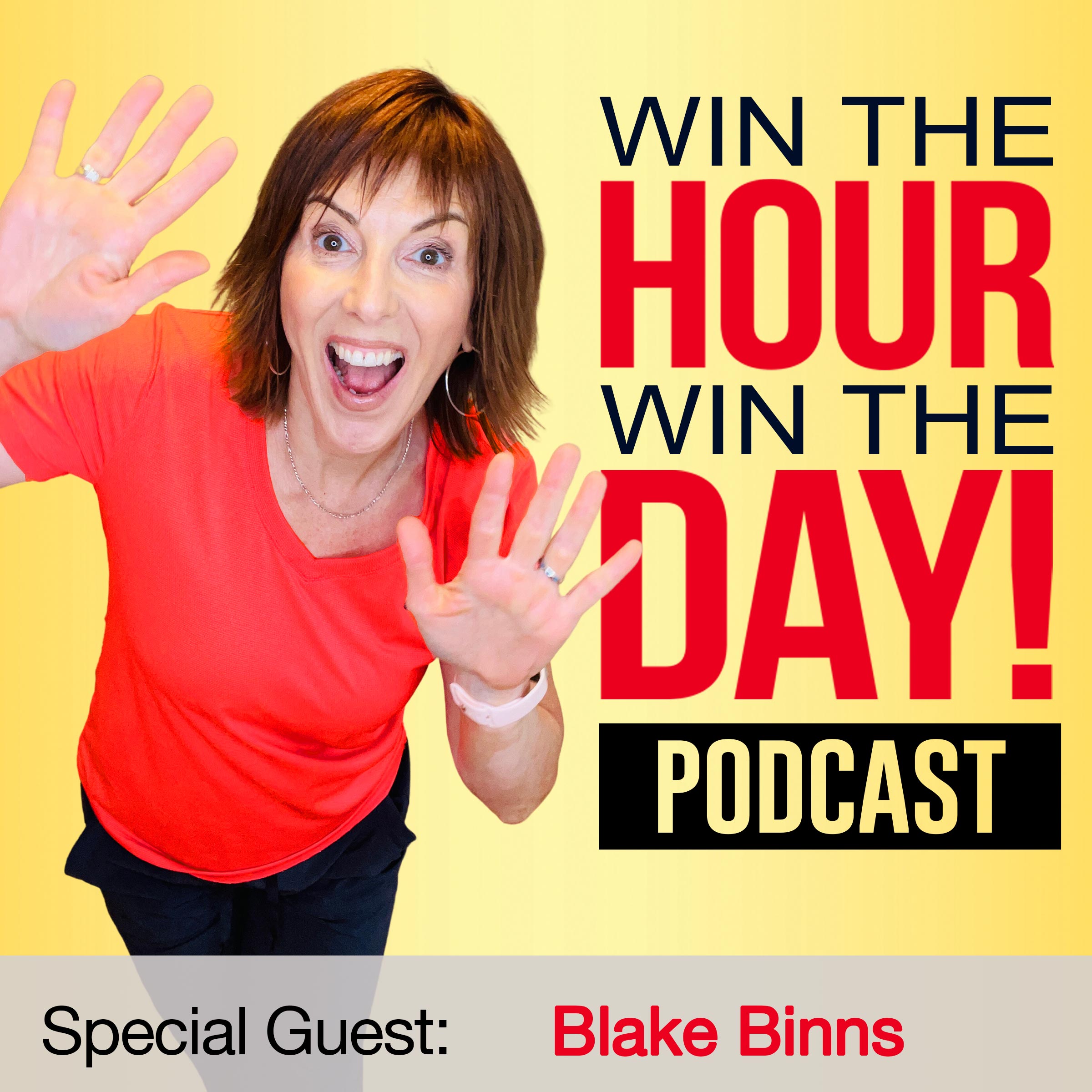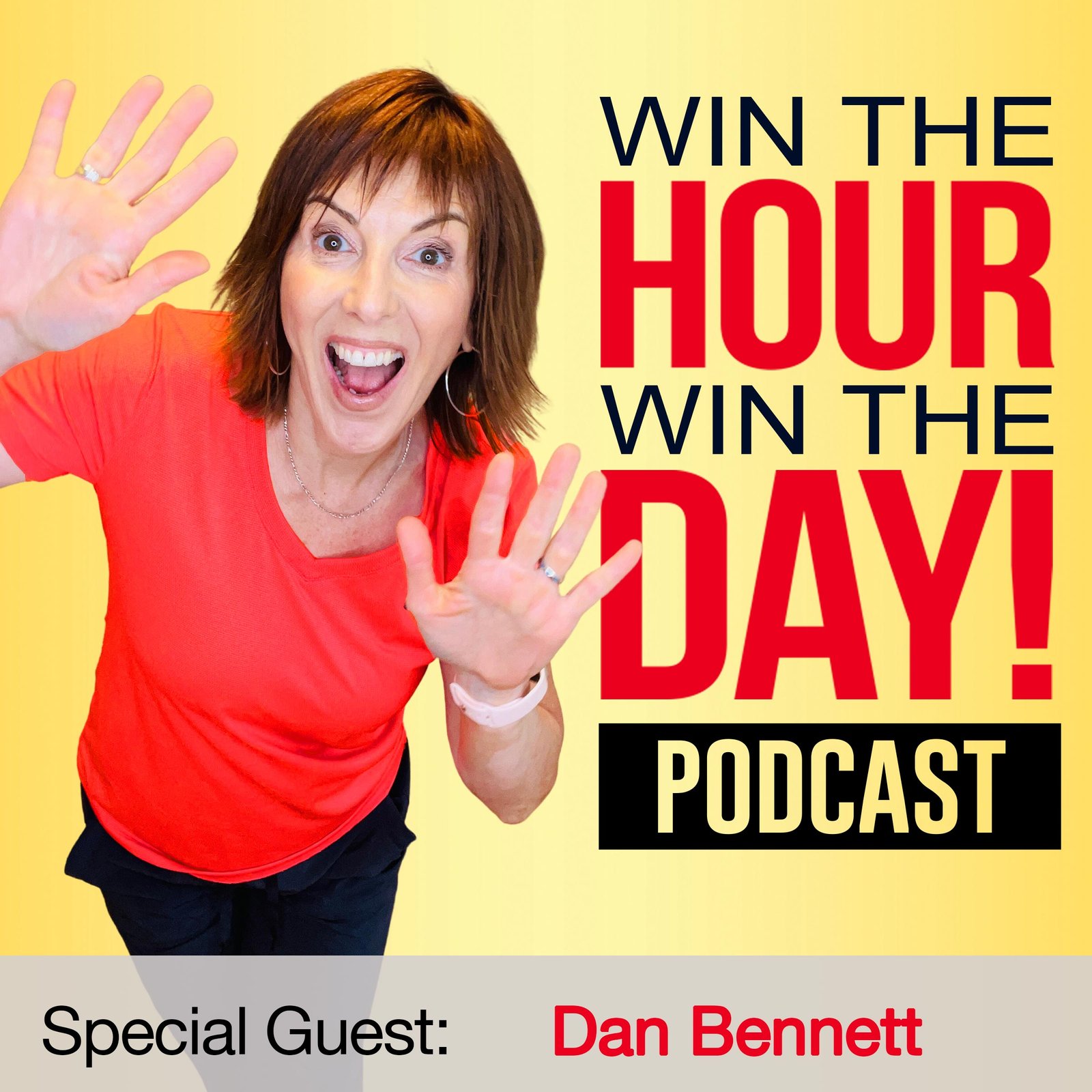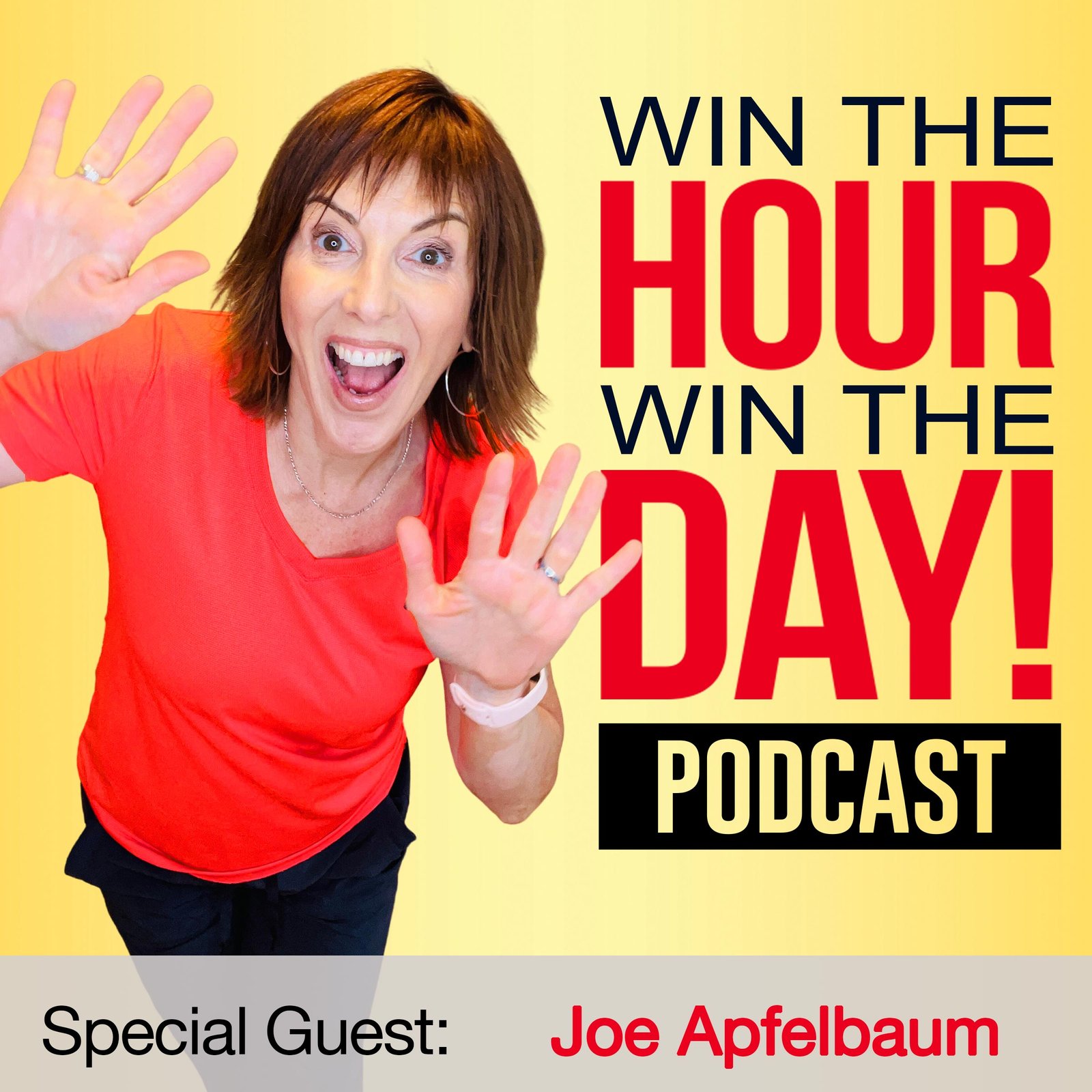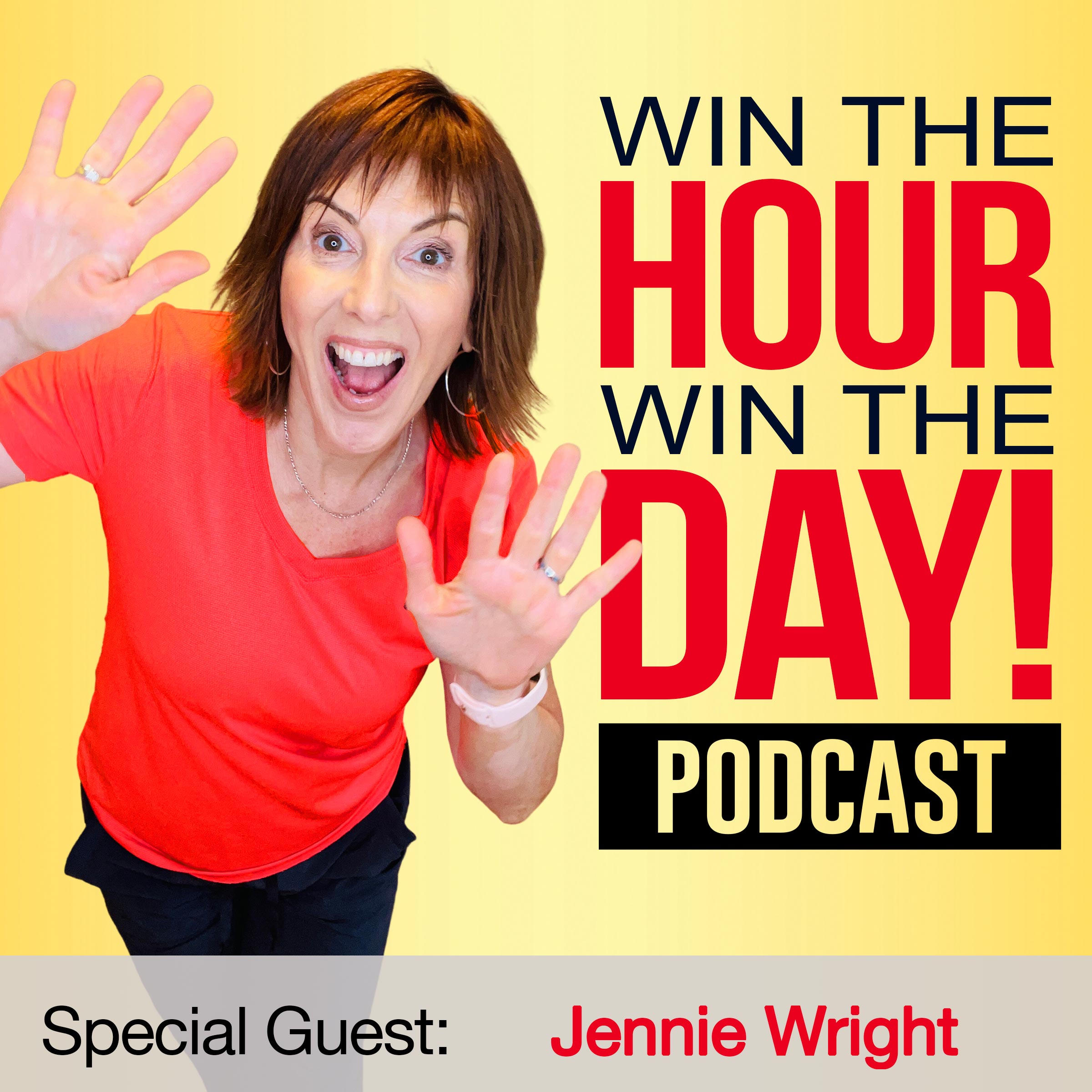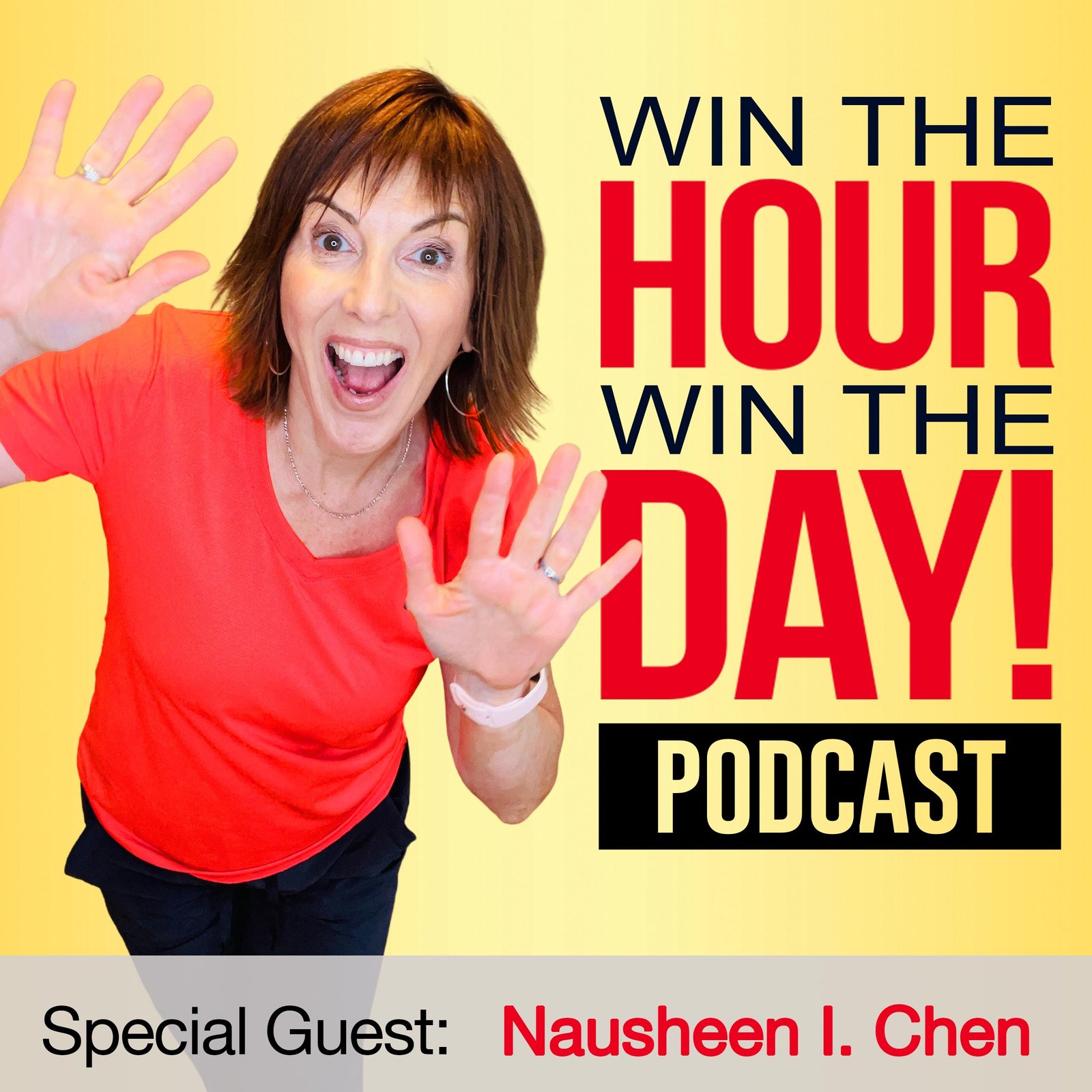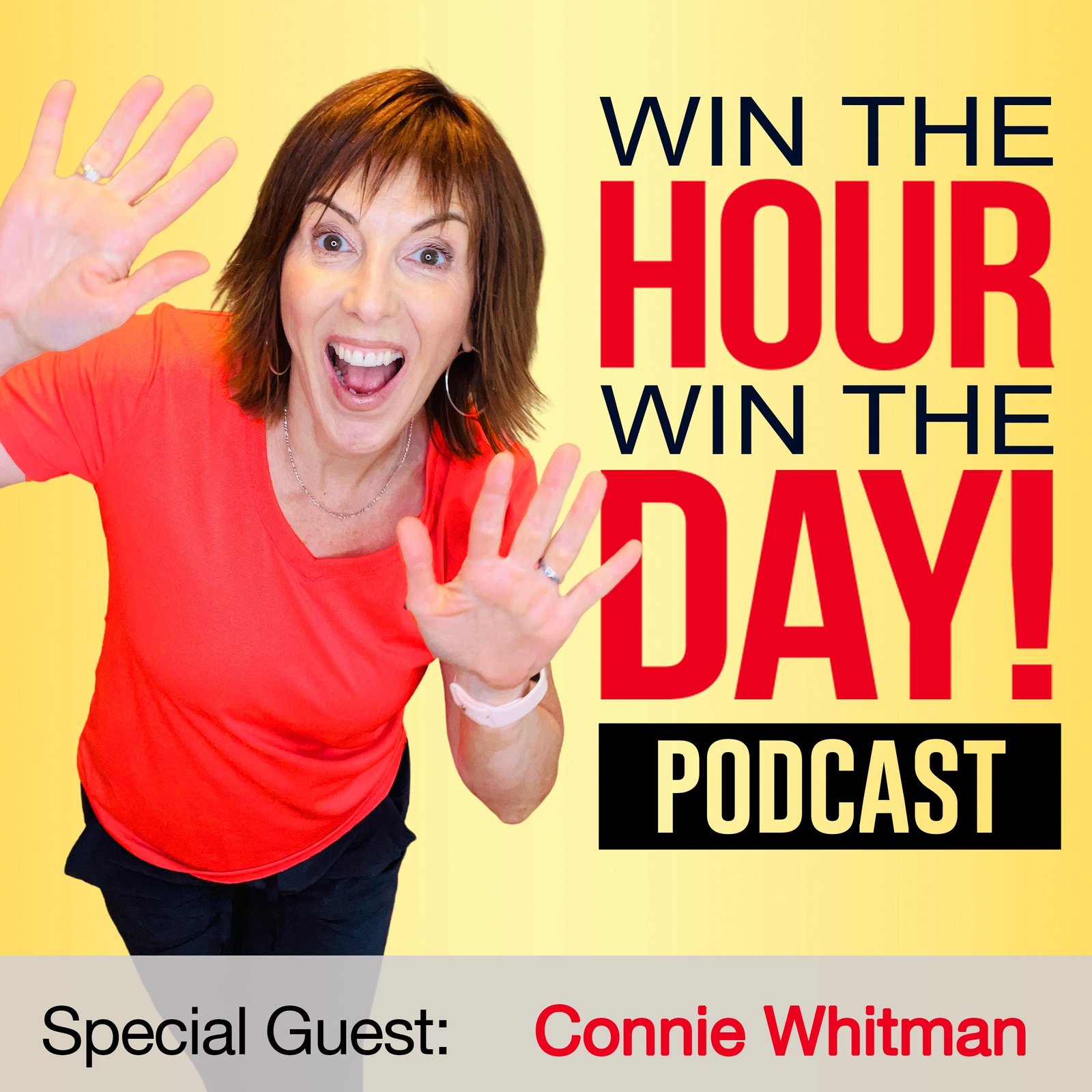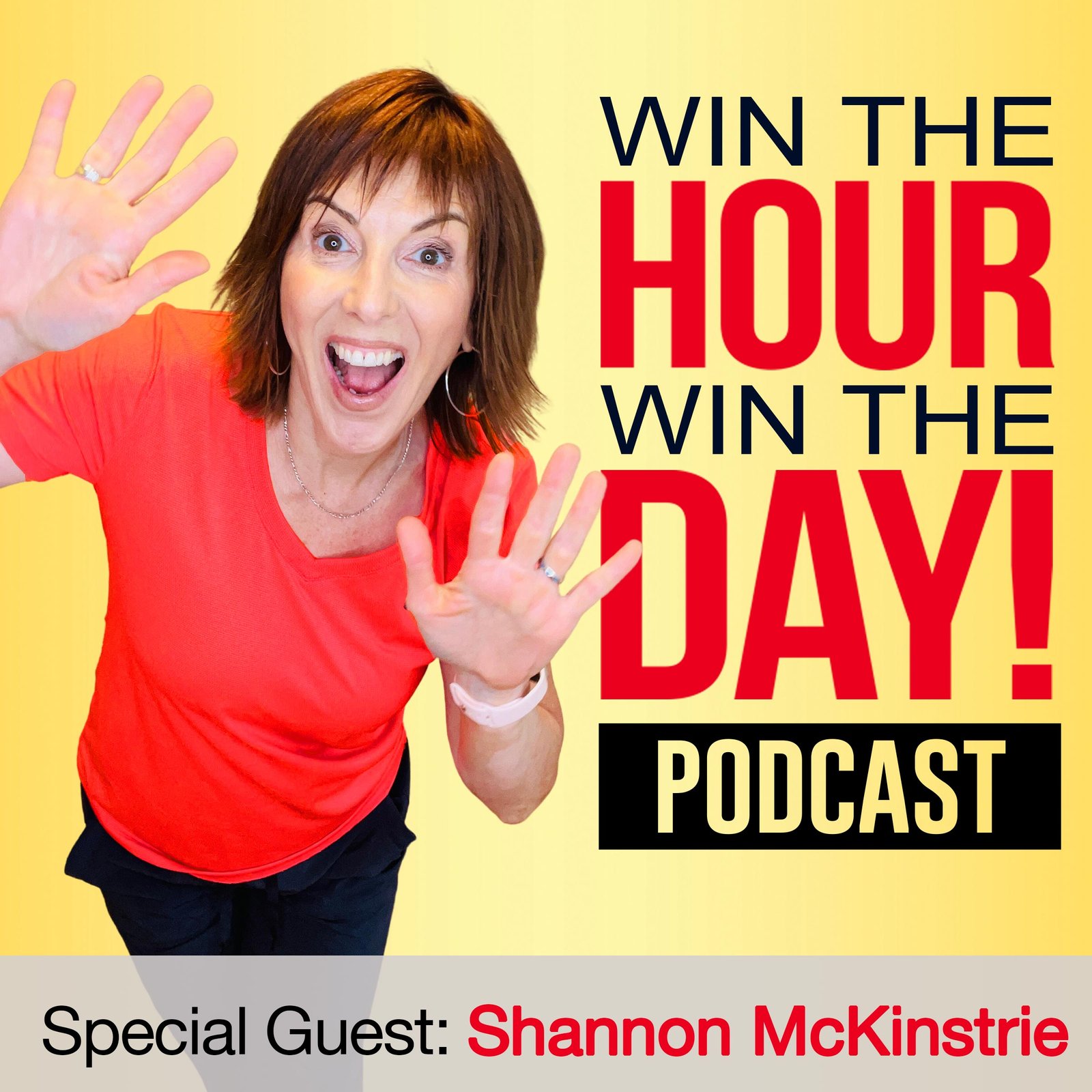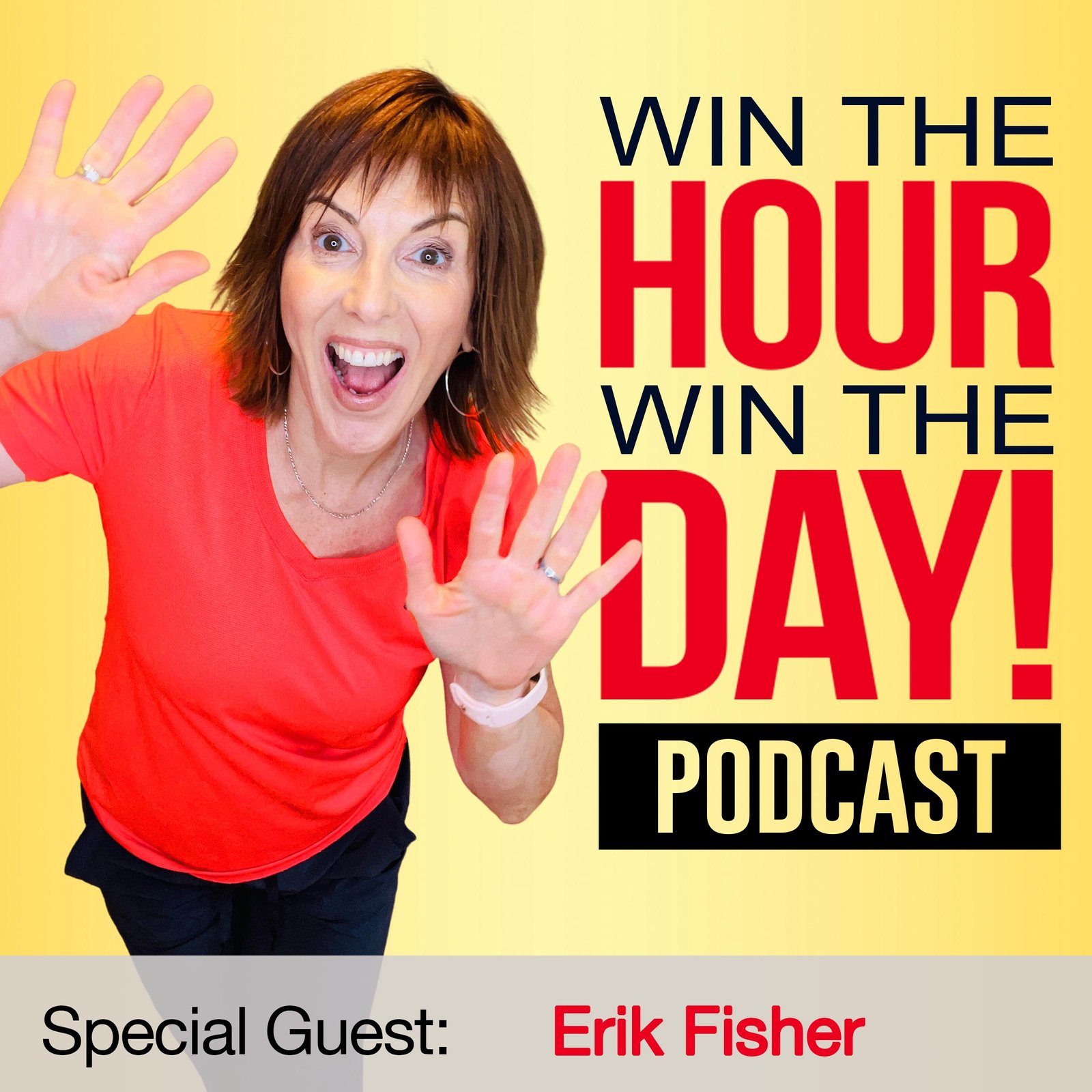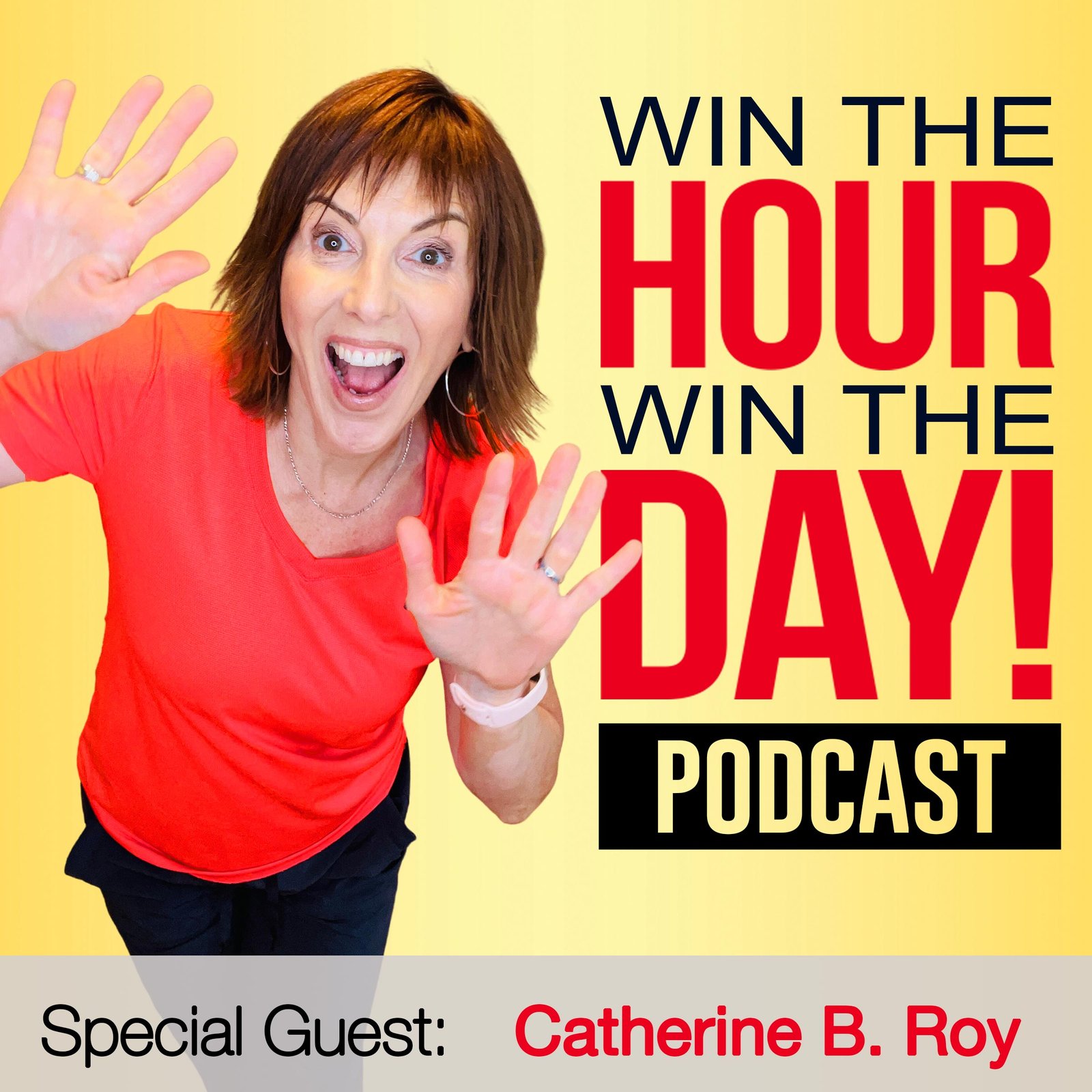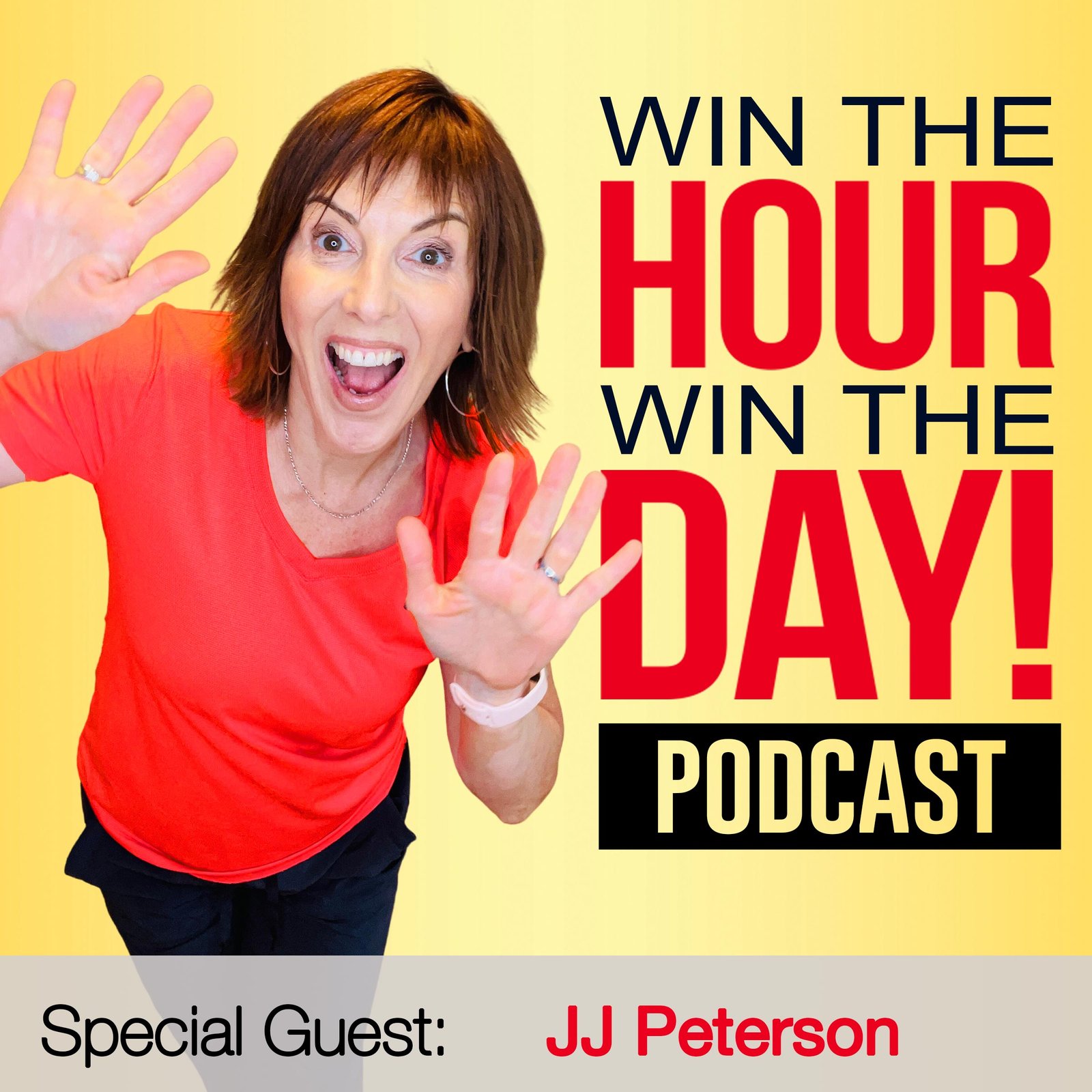Episode Summary This week’s episode of Win The Hour, Win The Day Podcast is...
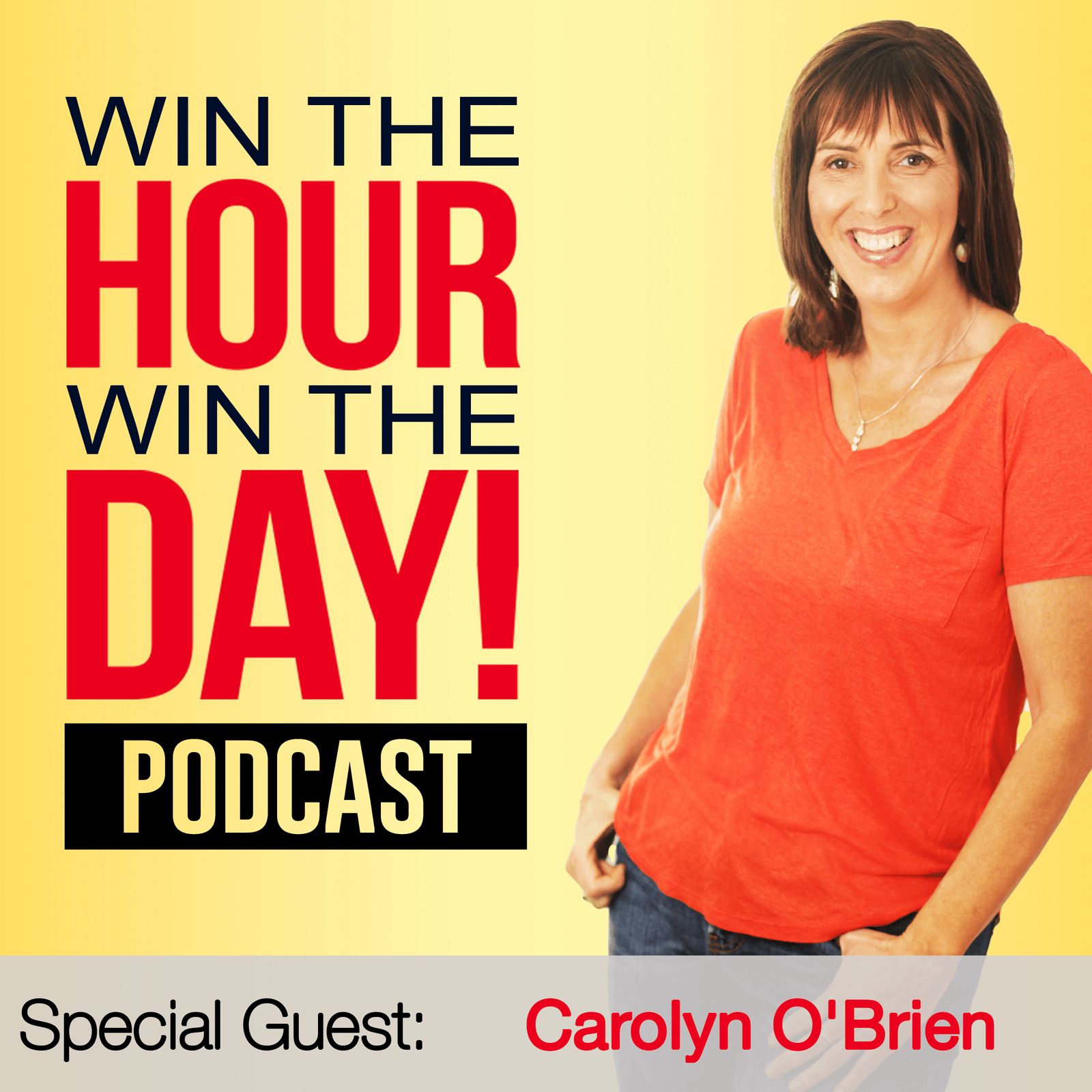
Are You Ready For Your Next Big Win?
Know your entrepreneur personality and I’ll take it from there!
Recent Podcast Episodes
Preventing Burnout with Smart Work Tools! with Kris Ward
Episode Summary This week’s episode of Win The Hour, Win The Day Podcast is...
Master Social Selling: Heidi Medina’s Strategies for Engagement
Episode Summary This week’s episode of Win The Hour, Win The Day Podcast is...
Boost Productivity and Master Storytelling! with AmondaRose Igoe
Episode Summary This week’s episode of Win The Hour, Win The Day Podcast is...
Master Video Marketing: Top Tips for Entrepreneurs with Dan Bennett
Episode Summary This week’s episode of Win The Hour, Win The Day Podcast is...
Boost Your LinkedIn Strategy with AI Tools for Enhanced Productivity! with Joe Apfelbaum
Episode Summary This week’s episode of Win The Hour, Win The Day Podcast is...
Mastering Personal Branding with NLP Techniques! with Olesija Saue
Episode Summary This week’s episode of Win The Hour, Win The Day Podcast is...
Innovative Lead Generation and Email Automation Secrets with Jennie Wright
Episode Summary This week’s episode of Win The Hour, Win The Day Podcast is...
PR Strategies for Diverse Entrepreneurial Impact! with Jennifer Singh
Episode Summary This week’s episode of Win The Hour, Win The Day Podcast is...
Convert More Clients on LinkedIn with Richard Moore
Episode Summary This week’s episode of Win The Hour, Win The Day Podcast is...
Master Business Growth on Pinterest with Meagan Williamson
Episode Summary This week’s episode of Win The Hour, Win The Day Podcast is...
24/7 Sales Boost: Video Marketing Secrets with Alex Sheridan
Episode Summary This week’s episode of Win The Hour, Win The Day Podcast is...
Master Public Speaking Tips with Nausheen Chen!
Episode Summary This week’s episode of Win The Hour, Win The Day Podcast is...
Beating The Burnout With Connie Whitman’s Success Story
Episode Summary This week’s episode of Win The Hour, Win The Day Podcast interviews,...
Craft Your Social Media Content Strategy With Shannon McKinstrie
Episode Summary This week’s episode of Win The Hour, Win The Day Podcast is...
Boost Your Productivity with AI Tools: A Deep Dive with Erik Fisher
Episode Summary This week’s episode of Win The Hour, Win The Day Podcast is...
Boost Visibility: Repurpose Content and Leverage Podcasts With Christina Lenkowski
Episode Summary This week’s episode of Win The Hour, Win The Day Podcast is...
Master Personal Branding & Storytelling with Lisa McGuire
Episode Summary This week’s episode of Win The Hour, Win The Day Podcast is...
Boost Business on LinkedIn with Catherine B. Roy’s Strategies
Episode Summary This week’s episode of Win The Hour, Win The Day Podcast is...
Scale Your Business: Optimizing Virtual Assistant Services with Kris Ward & Rachel Eubanks
Episode Summary This week’s episode of Win The Hour, Win The Day Podcast is...
Affordable PR Mastery: Crystal Richard Unveils Modern Techniques
Episode Summary This week’s episode of Win The Hour, Win The Day Podcast is...
Mastering Business Storytelling with JJ Peterson’s Guide
Episode Summary This week’s episode of Win The Hour, Win The Day Podcast is...
Revamp Your About Page: Guide to Personal Branding
Episode Summary This week’s episode of Win The Hour, Win The Day Podcast is...
LinkedIn Mastery and Video Marketing Secrets with Alex Sheridan
Episode Summary This week’s episode of Win The Hour, Win The Day Podcast interviews,...
The Systems and Processes Playbook: Insider Secrets to Streamlining Your Small Business with Leah Abunales
Episode Summary This week’s episode of Win The Hour, Win The Day Podcast interviews,...
Metrics For Business Performance And Why! With Carolyn O’Brien
Episode Summary
Carolyn O’Brien talks about metrics. Numbers? That didn’t sound interesting to me at first. But Carolyn brings great clarity to the matter. Listen in as Carolyn schools us on some basics you need to grow your business!
Learn:
-how to easily track the health of your business
-when metrics matter and how to track them
-the biggest mistakes most entrepreneurs make and why
And so much more!
Join The Community: https://www.facebook.com/groups/WinTheHourWinTheDay/
Win The Hour, Win The Day! www.winthehourwintheday.com
Podcast: Win The Hour, Win The Day Podcast
Facebook: https://www.facebook.com/winthehourwintheday/
LinkedIn: https://www.linkedin.com/company/win-the-hour-win-the-day-podcast
You can find Carolyn O’Brien at:
Website: carolynobrienobm.com
Facebook: https://www.facebook.com/carolynobrienobm
Email: carolyn@carolynobrienobm.com
Masterclass: Working Hard Sucks And It’s Costing You Money!
https://winthehourwintheday.com/working-hard-sucks-and-its-costing-you-money-masterclass
Win The Hour Win The Day
https://winthehourwintheday.com
Check out the Outsourcing Playbook For Busy Entrepreneurs here: https://winthehourwintheday.com/outsourcing-playbook
Carolyn O’Brien Podcast Transcription
[00:00:01]Kris Ward: So we’re going to do that. I can sometimes put my finger up to try to dive in, but then don’t say, okay, go ahead. Like, I’m giving you a non-verbal cue. And I have to tell people that because sometimes they talk to me and like, no, that wasn’t the goal. All right. So we have Carolyn O’Brien. I can’t mess that up.
[00:00:20] Take a selfie and record. We set that gallery view or their full screen. Check my mic.
[00:00:35] Okay. We are recording who’s timer.
[00:00:44] Okay.
[00:00:58] Okay
[00:01:04] Oh my notes.
[00:01:11] Sorry.
[00:01:25] Just printing out one more thing. And of course it’s always slower and somebody’s waiting.
[00:01:29]Carolyn O’Brien: No worries.
[00:01:53]Kris Ward: So we’re gonna talk about…
[00:02:17] All right. Are you bored yet? Okay, there you go. It’s a beast to go
———————————————————————-
START[00:02:38]Kris Ward: Hey, everyone. Welcome to another episode of Win The Hour, Win The Day Podcast. I am your host, Kris Ward. And today we have Carolyn O’Brien in the house. Now, listen, she’s going to talk to us about metrics, but I’m going to be honest. Numbers are not my friend.
[00:02:54] And I gave her some pushback on this. I’m like, listen, I think this is going to be a dry topic and I’m not good at math. And I find numbers really stressful for entrepreneurs because all you do is know the numbers you don’t have that you think you need. I don’t. I have never found that soothing, but Carolyn assures us that she can guide us through this process and heaven help us almost start to like metrics. All right. No pressure, Carolyn. Welcome to the show.
[00:03:21]Carolyn O’Brien: Thank you so much. I’m so excited to be here.
[00:03:23]Kris Ward: Well, I’m excited that somebody else is excited about numbers because listen, I argue that there is nobody worse in the world at math than me. And I know the metrics are not really about math. It’s just sort of seeing where the numbers go.
[00:03:35] But I believe in the part of the brain where they gave you the math aspect, there is like an open window with leaves flowing around that side of the flight. And I have stories to prove it, but you did show me some stuff where you can make it more interesting. And I do see the value in that in my own company.
[00:03:53] Like we do track things now week to week, we have a stats meeting, but it took me a long time to get there. And I think I missed out on a lot of things. So let us know, first of all, why should we focus on metrics? So what are metrics? Hold on, sorry. And even when our metrics, we’re not just talking, you know, like what our metrics are we talking about? Sales, all that stuff. That’s right.
[00:04:11]Carolyn O’Brien: Yeah. So when you’re thinking about metrics, when it comes to your business, the first thing you want to look at are what I call money metrics. So if you’re running a business, you need to know the money coming in, the money coming out. And so what is a metric? Right? A metric is a quantifiable number or data point that you can track on a regular basis to understand what’s happening in the business.
[00:04:33] So money metrics and marketing metrics fit into how you really understand the health of your business and what’s working and what’s not working. And so the value of it is that it takes a lot of the emotion and guesswork out of deciding what to do next in your business and what to focus on. So a lot of the times…
[00:04:53]Kris Ward: Let me jump in for a sec though. So sometimes I’m sure we’ve all experienced this, or maybe I’m the only one, like back in the day in the beginning, I didn’t want to look at numbers because it was too painful. Like I knew I was operating at a loss in the beginning, but I had a plan and I just had to stomach it and grunted out and stuff like that.
[00:05:10] But if we had done it your way and we took the emotion out of it, I might’ve seen not just the sales. Like I need more sales. I might’ve seen where, where I could get more sales or where the hole in the boat was versus just having it. One big thing is, I’m not making enough profit to satisfy my desire. Would that be you’re arguing?
[00:05:30]Carolyn O’Brien: Exactly. So maybe your sales conversion or how many people are actually buying is pretty good, but the hole on the boat, as you said, is the number of people showing interest in your business, the leads, maybe that’s where you need to focus. And so without tracking, kind of that funnel or the customer journey, you don’t really have an idea of where to focus your attention and energy and decide how to move forward in your business and what decisions to make.
[00:05:56]Kris Ward: Yeah. And that’s a good argument and I know, you know, close your eyes and then praying don’t I don’t wanna look at the numbers is a tactic that has probably been used by many, but I know for me, I often tie things into health and fitness because everybody, at some point is wanting to lose five pounds.
[00:06:12] Right. And so it’s kind of like when somebody makes you journal your food activities. And that seems, oh, that’s ridiculous. That’s labor-intensive all that stuff, but I’ve seen it where I focus on health. So people will come to me and my family or somebody who wants to lose weight or something. And all of a sudden they’re like, well, I only had a Turkey burger for lunch.
[00:06:31] It was really good. It was low fat. And then, because we’re not, you know, they’re not writing everything down. They didn’t notice that they put four tablespoons of Mayo. That’s 200 calories. So there’s all these hidden numbers. It’s like, oh, that’s… Or they had a big old smoothie from a coffee shop that was made of fruit, but that’s like 1200 calories.
[00:06:48] So they’re thinking, no, I only ate the burger, but there’s so many other numbers there. They didn’t understand. So I think that in the vein of what you’re talking about is like, look, don’t just get your stomachs nauseous because your sales aren’t where you want them to be. There’s all these other things we can change that perhaps would really not only improve your numbers, but make you more enlightened and more empowered, I guess.
[00:07:12]Carolyn O’Brien: Yeah, exactly. And so the key is basically like starting, right? Like even when you’re tracking the calories you’re taking in on a daily basis, you have to start somewhere, but then kind of once you get the hang of looking at a couple of metrics, getting comfortable with it, then you can really break it down to determine
[00:07:29] where those holes are, or exactly what’s going on. And so, I work with people who say like, just nothing working right now. I’m not getting enough sales. And then when you break down and you look at maybe like, okay, the leads coming into the business and how many of those people are purchasing.
[00:07:45] But in between that there may be landing on a page, right? And then are they going to ‘a sales page to a checkout page?’ And if you start tracking each of those steps, you can kind of see where the breakdown is. And figure out what may need to be fixed in order to increase that sales number at the end of the funnel or the end of the customer journey.
[00:08:04]Kris Ward: Yeah. And they might’ve been sales as for sales opportunities for sales calls and only got two and they’re beating themselves up, but that’s 50%, which is way above the average. Right. So, so you’re right. Looking at the numbers is the mature thing to do. I wasn’t always mature, but it is, it is the grown up entrepreneurial thing to do.
[00:08:26] Okay. So that’s why we want to focus on our metrics because it will let us know what we need to work on. Right. It’s not all or nothing. I don’t have enough sales. I’m not making enough money. So just put your head down, work later, come in earlier. And that’s not the solution. Right. Okay. So where do we start? When we’re looking at metrics?
[00:08:45]Carolyn O’Brien: Yeah. So the first thing, if you’re running a business, it has to be the money metrics. What are the rev? What’s the revenue, what’s the sales numbers. Are there refunds involved? And then the only additional metric that I say start with is the number of leads or the number of people showing interest in your business.
[00:09:03] Because if you don’t have that, you really don’t have a full picture of how many people are converting. And so those are the ones to start with. When you get comfortable there, then you can kind of add on all of the additional aspects, but it becomes overwhelming for people if they think, oh my gosh, I have all of these pages.
[00:09:20] I have my website I want to look at traffic for, you know, I have all these different sales figures. Just start with the basic money metrics in your business, and then slowly incrementally add on additional metrics you want to look at. I’ve been working with some clients for a couple of years, and we’re still revising the numbers we’re looking at or changing how we’re looking at things.
[00:09:41] And it’s been two years and we’re still adding and revising. So don’t feel like it’s all or nothing, start small and then grow.
[00:09:49]Kris Ward: Right? Yeah. Nothing. I would see others, somebody, another show just said something better than ‘level one is better than level none’, something like that. So just start somewhere and you can tweak it, right?
[00:10:04] Yeah, absolutely. And we do that too. You’re right. We have a stats meeting every week and we’re always looking at stuff and tweaking. Okay. I do need to know this number or maybe I don’t need to know that number, but at least I know something now. So just get started and it doesn’t have to be fancy. It can be really simple, just a very basic spreadsheet through Google, whatever. You talk about also.
[00:10:25] And I really resonate with this, making it visually pleasing. I know initially when people start working with me, I think they think I’m a little crazy trying to make these things pretty, but if it doesn’t and I’ve… Evan helped me, I read whole books on just how wide spice soothes the eye and how people navigate through information more, uh, you know, eloquent, like just, it’s more digestible if it’s laid out a certain way.
[00:10:49] So I’m really big on that as well, because I used to hate, hate, hate spreadsheets. Like to me, it was just like a whole bunch of numbers yelling at you at the same time. And then one person in my team, she.. oh my gosh. She just makes them look, numbers look interesting and fun, and I’m sure she could get NASA to launch a rocket ship every Friday with the numbers she’s got.
[00:11:08] So now I’m all about it. But before I fought it for a really long time, it was really how the information was given to me, how it was laid out. And that’s a big part of what you believe in as well.
[00:11:17]Carolyn O’Brien: Yes. A hundred percent because a lot of CEOs or business owners, they consider themselves to be visionaries, right?
[00:11:26] Like they’re not in the numbers. They’re scared of the numbers. They hate spreadsheets.
[00:11:30]Kris Ward: Oh, I thought I was alone. Okay. I just thought I was in that group trying to pretend like, oh, look at me. I’m pretending I’m smart, but they don’t know how I’m so bad at numbers. So, then lots of them hate numbers.
[00:11:40] Okay. Good, good, good. Feeling better about herself. Okay.
[00:11:44]Carolyn O’Brien: What I’ve found is that if you can graphically represent these numbers in a spreadsheet, it makes a huge difference. Right? So looking at a spreadsheet of 50 lines, even with multiple columns of data, even for myself, like your eyes glazing over, it’s hard to see trends.
[00:12:02] It’s hard to kind of pick apart every column to figure out like, what should I be looking at? Yes. I see all these numbers on the page. Like, what do I do with this? And so I found making graphs or charts, from the data, it makes a huge difference for the business owner who needs to look at it for analyzing and then for making decisions based on it, looking at a bar graph to see
[00:12:23] sales conversion week over week. It’s a lot easier to spot trends and to see what’s going on. And if you’re looking at numbers in a single column on a Google sheet, and so start with the Google sheet, of course, that’s where you track it, but then determine a way to visualize it. You can make graphs and charts in Google sheets in Excel.
[00:12:42] There’s multiple dashboard platforms that you can use. I happen to use Google data studio because it connects so easily. The Google sheet. But just representing it in a visual way makes a huge difference. And another thing I always say is…
[00:12:57]Kris Ward: Hold on, let me jump in there for just for a second. You don’t mind, first of all, that bar graph that it just said is the only thing I, so help me in all my years of grade school and high school.
[00:13:06] It’s the only thing I did well in math. And here’s the sad story. Not only could I understand the bar graphs, but I colored them in. Slack, here we go. This I can do. So I have fond memories of bar graphs. It is the only thing that ever was nice to me. But then I think let’s not skip over this because until we chatted, I did not know of data studio, Google data studio.
[00:13:27] I had, I had never heard of that. It wasn’t something I avoided and like, no, I’m not a numbers person. I did not know that. And you showed that to me too. So do they just, do we just Google in ‘Data Studio?” Is that where it takes us? We just go there.
[00:13:42]Carolyn O’Brien: Yeah. Yeah. So just type in, on your, in your browser, Google data studio, you’re going to be route to it.
[00:13:48] And it’s free software. If you have a G-suite account or Google workspace, they’re calling it now. You can use it for free and it connects directly to Google sheets. It also connects to other platforms, through different API integrations. I find Google sheets the easiest because that’s typically where we’re dropping data in the easiest way to get started.
[00:14:10] And I’ve found that to be a game changer in terms of ease, easily visualizing data. Once the dashboard is set up there. It auto-updates. So it’s dynamic as soon as the data is in the Google sheet, it updates. So it’s basically like there’s an initial setup. Yes. But from there, as soon as the data center and the sheet, it updates automatically, you can look at things in, on a daily, weekly, monthly, quarterly, whatever timeframe you want.
[00:14:43] You can easily update the graphs, add new pages, and change how you’re looking at things. And so it’s totally customizable and flexible to how you want to look at data. And so that’s the thing that I was saying is that I may create a dashboard that’s good for, you know, a quarter or two. And then we think, okay, we actually want to look at things a little bit differently, or like let’s compare quarter over quarter for the last year.
[00:15:07] And see how things are when we’re typically looking at things on a weekly basis and Google Data Studio allows you to do that pretty easily.
[00:15:15]Kris Ward: Oh my gosh. Okay. Listen, I’m on all kinds of podcasts. People are all kinds of people that come on my show. I think I really have a healthy network. I’m out there. I’ve been doing this awhile.
[00:15:26] Never heard of it, never. Okay. So, okay. Never heard of it. So we want to be looking at the money metrics. Then what are some, like once we do that, when are we diving too deep? When are we not diving deep enough? What do you do? How much time do we spend on this? Like, what does this look like in our day to day life?
[00:15:49]Carolyn O’Brien: So what I like to do is just build a process so it’s a weekly thing, right? Like every Monday morning, you or a team member has it, you know, in your project management tool that you’re going to pull metrics on a weekly basis. The only time I will say to do it more frequently than that is if, if you’re in the middle of a launch or a promotion, like
[00:16:08] you want to make sure nothing’s broken or like, if you need to make last minute tweaks or adjustments, you have the ability to do it. But otherwise weekly makes the most sense from what I’ve seen. Because if you think about things like on a daily basis, there’s a ton of fluctuations. I even look back to this last year and like everything that happened in our world, right.
[00:16:29] Random things that were happening in the news and across the media where it could affect traffic levels and all of that. So if you’re making decisions on daily numbers, then you may not be seeing the whole big picture, right. Or if someone lands on a page, maybe they go back to that page the next day.
[00:16:46] But if you were looking at a conversion for one day only, you may not be able to see the effect of that. So weekly, I also think weekly is a lot more easy to swallow for someone who’s just getting started; on a Monday, start with weekly metrics. Then what I say is then you can start to aggregate things on a monthly and quarterly basis, but start weekly, just get the data in and then start tracking trends.
[00:17:13] Once you have a couple of weeks worth of data, you’ll be able to spot trends and you’ll be able to see where you want to focus your attention. And that’s when you can start to decide, okay, I need to change this aspect, or I need to focus on this aspect and that you can start to dive in.
[00:17:31]Kris Ward: Are you even talking about like, do you track social media? Like, are there things like, when does it stop or does it get addictive or there are just things that are not worth your time.
[00:17:44]Carolyn O’Brien: So social media, I think, comes up a lot because some people think it’s vanity metrics and I don’t really care how many followers I have. I say, if it’s important to your business, then track it, right?
[00:17:54] If you care about the followers or if your audience is on Instagram, then yeah. You probably do want to track the followers or engagement happening on those platforms. But if social media is not part of your business, you don’t care about followers. It doesn’t impact the bottom line. Then don’t worry about it.
[00:18:10] Don’t focus your attention there, but, you know, in addition to the money metrics, it’s email metrics, right? How many emails are going out? What’s the open rate? What’s the click through rate, page views, page conversion, checkout page views, checkout page conversion. And then, you can start to look at what I call CRM metrics you are basically looking at, you know, percent repeat customers or what’s the retention of your audience or of your customers. And so there’s a bunch of different things you can slowly add on, but I don’t want to get anyone overwhelmed thinking about every single thing, right? Start somewhere, and then add as you get more and more comfortable.
[00:18:57]Kris Ward: Yeah, that makes sense. I know for us, we do that. And then my social media person, she even has a thing where we repost something and change the title. So we have a comparison, like, okay, this posts, this title, oh my gosh. Did way better than that one. And it was the same content. It was just a different title.
[00:19:14] So we even learned that shorter titles seem to do better so that it is really interesting when you start doing it, but you’re right. Start somewhere. And then you can always add on, versus closing your eyes. And ah..
[00:19:27]Carolyn O’Brien: And I love how you brought up your team member who does social, because I think one of the things you can realize is that.
You can set goals and KPIs and break out metrics based on the team members who have, and their responsibilities. If you have someone focused on social media, then yeah, you should track the performance to see if they’re hitting their goals and their KPIs. If you have someone focused on email marketing, then you want to make sure those numbers are being tracked.
And so, then metrics becomes, how is your team performing? And do I need to make adjustments based on our goals, our KPIs or team members?
[00:20:03]Kris Ward: Yeah and you guys know I’m all about leveraging your time. The 60-40 formula being in creation mode, 60% of the time and admin mode, 40% of the time. So I will tell you that when we meet for our stats meeting, it’s about 15 minutes and I would say it might take anyone to gather the numbers that they’re going to spoon feed to me, for us to discuss.
[00:20:23] I would say the way it’s set up, it takes each one of them 15 minutes to do that. Right. So it doesn’t have to be labor intensive. And I did avoid it way too long, like shockingly. So I’m embarrassed to say it was just sort of, like you just said, it’s kind of like, what’s your… when you used to get snail mail, like, I don’t think I’ll open that bill or wait till they send me it in a different color.
[00:20:45] Right. Then I know I’m a problem, so, okay. So when do people like, you know, you’ve got a corporate background and then you deal with businesses. And when would you say, ‘Hey entrepreneurs, you’re missing the boat. If you don’t start, like, what is it you bring to the table that, okay, I’m looking at numbers, but when you look at them, obviously you do it differently.So what does that look like and why, why would we be doing it?’
[00:21:13]Carolyn O’Brien: Yeah. So I think what I try to help business owners see is that it’s never too early to really start tracking metrics. Right. I think a lot of the time, even service-based businesses or service providers feel like I’m just like working with a couple of clients here or there.
[00:21:29] Like, I don’t really have metrics to start tracking, but the reality is you do have some numbers to start tracking whatever that is. Maybe it’s DM conversations you’re having, maybe it’s discovery calls, right. So it’s never too early to start. And then my hope is working with business owners that they see that as a business owner, you need to know your numbers.
[00:21:49] Like you, whether or not you’re pulling it yourself, but you’re still having a meeting every week to go over it and make decisions based on it. And two, they don’t or three, I guess they don’t have to be scary numbers. Don’t have to be scary as a business owner, figure out a way that makes it digestible for you.
[00:22:06] Make it look pretty, have a team member help create a dashboard for you. But you have to be looking at it on a regular basis and it can become fun. I’ve worked with people who now are excited to look at the numbers, right? Because they like looking at the dashboards and their brand colors are presented on the dashboards and it just becomes part of the weekly process.
[00:22:29] And so, making data-driven decisions is really at the end of the day, the only way to scale your business, because otherwise you’re just kind of guessing, like, I guess I should do this. Or like, maybe I should spend money here because that’s what other people are doing. But the numbers are kind of help guide you.
[00:22:46]Kris Ward: And I’ll tell you, it really does make a difference. Like when we were looking at even social media numbers and we, for the longest time, when we put up a thing about our podcasts, we would do this little graphic and graphic designer did it and look very polished, look very nice. And so we were actually doing, we had Kevin Harrington, one of the Original Sharks from Shark Tank on the show.
[00:23:05] We put up our weekly thing of our podcast that is airing and blah, blah, blah. And then because of the nature of who he was and that, you know, we wanted to milk it a little bit more and he was just such a wonderful guest and brought such value and told such amazing stories. We put up another post and on the second post, it was a selfie of me and him.
[00:23:22] And then, we put him on the computer screen, so it’s not like I have pictures of me with him physically. It’s how I got him on the show. But, in this case, I’m in front of the screen, he’s behind it. He’s smiling. And then we just put a little border around it and it was unbelievable. The numbers, like it was something like 12 to one ratio.
[00:23:41] Of me and him in the selfie, even though he was on the computer versus the high-end graphic that I paid to get done, that looked more polished. And we would’ve never, never known that. Had we not compared the numbers, like I would’ve thought this one looks more professional. We paid to make this little banner, thank you very much.
We’re done. And then the selfie did so much better and it’s like, well, that was a game changer. And it really was obvious, cause we looked at the numbers.
[00:24:07]Carolyn O’Brien: Yeah. And I see people spending all of the time, people spending money all of the time having designers build out landing pages, sales pages, and those are valuable.
[00:24:19] But if you don’t see the numbers increase, like something’s not resonating with your audience, even though you feel attached to that page, cause you spent a lot of money on it. If the numbers don’t back it up, then you need to make adjustments. And then when you do make adjustments, the numbers then show what’s working and what’s not working.
[00:24:37] And so it does take kind of that emotional, like, ah, I love this page or I love this graph. But it’s not performing as well as I thought. And so then you can make changes based on what the numbers are showing you.
[00:24:49]Kris Ward: Well, Carolyn these are wise words, and we should have known them a lot sooner, but sometimes you have to, sometimes I like to say to people, oh, I know, I forgot
[00:24:57] I knew that. That’s right. So, common sense has to be brought to the forefront every once in a while. All right. Where can people find more of your brilliance?
[00:25:06]Carolyn O’Brien: Yeah. So I’m on Instagram at Carolyn O’Brien Strategist. My website is carolyn obrienobm.com and I have some resources on there for business owners looking to get started with metrics and get a better idea.
[00:25:20]Kris Ward: Perfect. And we’ll make sure to include all that in the show notes and everyone else, we will see you in the next episode.
END[00:25:28]Carolyn O’Brien: Thank you.
———————————————————
Perfect. All right. How was that for you? My friend. That was great. Thank you so much. That was fine. You’re welcome. All right. While I have you here and I have a few minutes, cause we finished early.
[00:25:41] We’re good. I’m just going to, oh, hang on. I need to look at me so much anymore. Hold on, speaker. There we go. So let me just hear when I want it. I want to jog your brain to we’re more prepared on Monday, if you don’t mind. Okay. One sec. Your bio. Okay. So your bio, so you’ve been doing numbers for like 12 years, right?
[00:26:10] Okay. So numbers and why did you start this? So I just didn’t fall into it. Yeah. So I basically quit my corporate job because I wanted, and when you were doing numbers in the corporate job, how did this volunteer? Oh, I would just say, I, I basically started out working in operations for different businesses and there were always numbers, um, there, and then I guess what I’d found out was I realized that.
[00:26:43] I would put presentations and quarterly business reviews together in ways that like my colleagues weren’t doing and they would come to me in terms of like looking at data or coming up with new data sets or how to present things to customers and clients. Um, and it was something that I just, I just did.
[00:27:01] And they didn’t realize that other people weren’t necessarily doing it or that it wasn’t, it didn’t come to them as natural. Okay. All right.
[00:27:16] Okay. Um, bear with me while I think, cause I’m gonna ask you questions if you don’t mind. Yeah, sure. Yeah.
[00:27:32] Okay.
[00:27:40] So even when you were a corporate you’re dealing with other businesses, right? Yeah. Cause I was in, uh, I worked in, uh, software. Um, and so my role was basically working with clients and partners and making sure they understood the value. And so often helping them understand the value of the software they just purchased is showing them data.
[00:28:14] Okay.
[00:28:23] Okay.
[00:28:35] Okay, so I’m going to work on this, but this is the angle that I’m coming at. So, so what I want to do is, uh, you can, you, you can to highlight what you want to highlight. So for example, I could say Carolyn Brian learned almost 15 years ago, that numbers are a game changer. Showing entrepreneurs, the power of data has been her passion since the onset of blah, blah, blah.
[00:28:56] So I’m still saying everything is true. You have been doing this for almost 15 years, we don’t need to break it down and do all this. People don’t need to know all that. Right. So we can tie it all together and show that, you know how I’m going to work on this at the beginning, he’s explaining how people started coming to you about numbers and you saw the power and then you want to help more entrepreneurs.
[00:29:17] All of that is true. We just don’t need to hit the speed bumps, like get a plane off, come down like this and say, well, I was in corporate and then I did this. And then I did that. Like, look, here’s the deal for almost 15 years, I’ve been working with businesses about numbers. The details don’t matter. So I’m not sure how much better.
[00:29:35] I can’t believe how much doesn’t it. Cause here your experience comes from nine years in the corporate world, working operations, strategic partner development and account management. I don’t like, I can’t like I, right. She’s worked in large established public companies, scrappy startups even worked with the company during the IPO.
[00:29:55] She, first of all, none of that, I don’t, I don’t even, we don’t know what that is. Right. Yep. Um, so when in corporate you managed to bolt. So it was just too many words and I keep getting stuck on the speed bumps. Like, like by the time I get to the end of the sentence, I forgot what the beginning was. But also these are words you’re talking to a peer.
[00:30:14] We’re not your peer. You’re educating us. So what we want to do is be focused on the outcome. Okay. So Carolyn Brian has learned almost 15 years ago that numbers are game changers, showing entrepreneurs. The power of data has been her passion since the onset, um, liberate, uh, making. So tell me some of the things you said data is we talked about this data.
[00:30:41] What does data do? It takes the emotion out of making business decisions. Take the cakes. The guests workout helps you focus, um, helps you scale your business, grow revenue. Okay.
[00:31:07] It also shows you what’s working, which I think a lot of people don’t emphasize enough. But like you said, if the sales conversion is 50%, then like that’s good. Yeah.
[00:31:39] Okay.
[00:31:48] Excellent. Okay. Just rough draft. Carolyn Brian has learned almost 15 years ago that numbers are game-changer showing entrepreneurs. The power of data has been her passion. Since the onset. Carolyn shows entrepreneurs, how to remove the emotion set of numbers, allowing you to focus and scale your business.
[00:32:03] You never need to be afraid of numbers. Again, you can see what’s working and build on it. Immediately
[00:32:13] start. Yeah. Now you’re like, oh, I gotta talk to her. That sounds hopeful. Right. So we want it, we want it to be like, we want it to be what’s the outcome. And I always like, if I’m walking along, oh, why do I need to talk to her? The other one was more of your resume. And although it was an impressive resume.
[00:32:33] It all really what it did at most of it is intimidate me. Like I can’t talk to her. She knows a lot about numbers and she’s going to be horrified to know that I don’t even track any of my numbers. And then also, if you want to be on podcasts, they need to know that you’re going to be as good of a guest as you are.
[00:32:52] And that makes it look like, oh, like I don’t even think I could hold my own with her. How’s it going to be good for my audience? Right. Right. Does that make sense? A hundred percent. Okay. So this is, um, a rough draft, but it will give us enough to start with on Monday and I’m just going to send it to you.
[00:33:19] I also wanted to make sure, um, is there a form for the referral? I know we talked about that last time. Oh, hold on one sec. Um, Carolyn, maybe w oh, I’m sending it to myself. So obviously multitasking is doing two things poorly at one time. Carolyn inspired business inspired business, right? Is that you? No, no, no.
[00:33:43] That’s not send that to her then. Carolyn, Carolyn O’Brien opm.com. Oh, there we go. So far. Okay. This is better than what you had? Yes. Oh, okay. Um, you can do it. And do you have an iPhone? Okay. So do you say, sorry, did you say referral or testimony? I mean, I did the testimonial, but referral, you mentioned some, sorry.
[00:34:12] I was too busy working on your work. I wasn’t listening. Okay. Sorry. So were referral is just somebody that you think would be a good guy yes. With shell, but here’s the deal. Carolyn, you are kind of relatively new business. So if you don’t have somebody top of mind that you think be great fit, don’t worry about it.
[00:34:26] I’ll cover for you. We’re fine. Like don’t make that oppression. Okay. I do have a couple of people though, that I’m thinking of right now. You just send them an email inviting. Hey, I was on her show. I think you’d have a good time. Just send me an email and CC them. And why do you think they’d be good? Yeah.
[00:34:41] Sound good. I’ll check. I’ll check with both of the people I’m thinking of. Um, And see if they’re approved. Okay. All right. So then we are good for Monday. You’ve got the calendar link. You’ve got a screaming start to your new bio, which I think is so, oh, good. So you’re happy that you can see, you can see how one is hopeful and refreshing.
[00:35:01] And the other is you’re smart, but I don’t want to, I like it. Let’s pretend we are, as they say on TV in a cocktail party. Um, if you start explaining that to me, I would move over here with my drink because she does not like, I’m not good enough. Whereas we want to tell people I am so smart that I can take you from here to here.
[00:35:23] I will help him get there versus intimidate you, right? Yeah. No, I think I’m, I’m notoriously bad about talking about myself. So like having someone help is like, I can just like see the huge difference. In fairness, I’m a marketing strategist. So I’ve been doing that as long as you’ve been doing this. Okay.
[00:35:44] And I also PR training. So if you had this skill set, you’d be annoying because you’d be great at two careers. Okay. So don’t worry about that. All right. I look forward to Monday. Awesome. Thank you so much. You’re welcome. Bye.
——————————————————————————–

